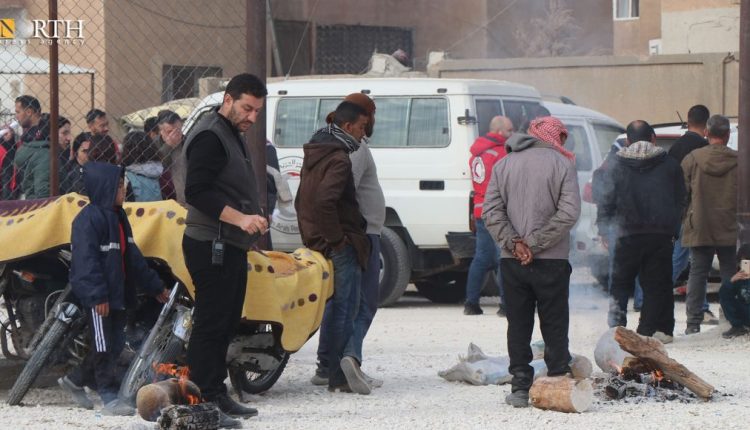
By Kardo Roj
HASAKAH, SYRIA – The story of Izdiar Rashou, a Yazidi man, encapsulates the horrors of displacement endured by thousands fleeing northern Aleppo. Traversing over 400 kilometers on a motorbike with his wife and four children, Rashou sought refuge in the predominantly Yazidi village of Barzan, located near Hasakah.
His journey is a grim reflection of the humanitarian toll exacted by Turkey-backed factions launching an offensive earlier this month. The operation targeted Kurdish-led Syrian Democratic Forces (SDF) in northern Aleppo, particularly the towns of Tel Rifaat, Fafin, Al-Ahdath, and Ahras, as well as surrounding villages and displacement camps.
For families like Rashou’s, this was not their first displacement. Many fled Afrin in 2018 during Turkey’s military operation, only to find themselves uprooted again, forced to escape escalating violence in the Shahba region.
Mass Displacement Amid Violence
According to new United Nations statistics, over 370,000 people were displaced across Syria in the recent wave of violence, with 200,000 fleeing northern Aleppo alone. Many have sought safety in northeast Syria, with others scattered across the region.
Rashou, a 42-year-old father of four originally from Afrin, described his second displacement as a “nightmare.” Speaking to North Press, he recounted harrowing encounters during his journey.
“On those dark, freezing nights, we fled in fear. Turkish-backed factions spread terror on the roads. When we reached the Aleppo–al-Bab highway, they began attacking us. We witnessed killings, kidnappings, and theft. Their language was filled with hate and threats: ‘Wherever you go, we will find you and slaughter you.’”
Rashou vividly recalled seeing corpses of both soldiers and civilians along the route. In one particularly gruesome sight, burned bodies marked the aftermath of horrific violence.
“They shot indiscriminately at civilians, killing a 14-year-old boy in front of us. The atrocities were beyond words.”
Witness to Inhumanity
Seventy-year-old Jaafar Hussein shared similar accounts of brutality. Fleeing Shahba for Hasakah, Hussein had already endured displacement from Afrin to Sardam Camp years earlier. This time, he found temporary shelter in a school-turned-refugee center in Hasakah.
Hussein described two killings he witnessed during their perilous escape.
“They attacked our convoy and killed an unarmed civilian in front of us. What crime had he committed? Later, they killed a man traveling with his livestock, stealing his animals after taking his life. Is this what humanity has come to?”
The elderly man expressed despair over the conduct of armed groups, questioning how such cruelty could persist unchecked.
Birth Amid Chaos
For some, the journey brought life amid tragedy. Jivara Hassan, 40, welcomed his second child during his escape. Originally from Ayn Dara near Afrin, Hassan had already been displaced to northern Aleppo in 2018. This time, he fled with his pregnant wife and daughter.
Hassan’s journey to safety was marred by fear and violence. He described relentless assaults by Turkish-backed factions targeting civilians along the route.
“They attacked our convoy, detaining people from their vehicles, killing some, torturing others, and even kidnapping women. Their hatred was palpable—they called us ‘pigs’ for being Kurdish. They vowed to follow and kill us wherever we went.”
Hassan recounted narrowly avoiding death multiple times when a military vehicle attempted to ram his motorcycle.
Amid these horrors, his wife went into labor prematurely upon reaching Raqqa.
“Due to the stress and exhaustion, my wife delivered 15 days early. We named our newborn ‘Roksh,’ meaning ‘bright face,’ hoping for a brighter future for him and for all of us.”
The Plight of Displacement
The displacement crisis in northern Syria reflects the compounded tragedies of conflict, with each wave of violence uprooting communities anew. Regions like Afrin, Shahba, and Tel Rifaat, once home to displaced populations from earlier conflicts, now face further destabilization.
For families like Rashou’s, Hussein’s, and Hassan’s, the journey is a grim reminder of the cyclical nature of suffering in war-torn Syria.
Displacement camps and makeshift shelters remain overcrowded, straining resources in northeast Syria. Humanitarian organizations are struggling to address the immediate needs of displaced families, from basic necessities like food and water to long-term solutions for housing and employment.
A Cry for Humanity
Eyewitness accounts underscore the dehumanization faced by displaced populations. Victims consistently describe the perpetrators as merciless, intent on spreading terror.
One recurring sentiment among the displaced is the absence of accountability for the actions of armed groups. Jaafar Hussein lamented:
“These are not humans—they have no morals, no conscience. How can such people be allowed to commit these crimes without consequences?”
Many now find themselves grappling with trauma, unsure of what the future holds. Hassan, reflecting on his child’s birth during such dark times, expressed a faint hope:
“Perhaps Roksh’s name will inspire a new beginning, not just for us, but for everyone suffering in Syria.”
International Response and Challenges
The escalating crisis has drawn calls for intervention from international organizations. The United Nations and humanitarian agencies are urging all parties to respect international law, protect civilians, and allow safe passage for displaced populations.
However, the complex political dynamics in Syria complicate relief efforts. While the Autonomous Administration of North and East Syria (AANES) has provided refuge to many, it faces mounting pressure to accommodate the influx of displaced persons.
The displacement crisis also highlights the urgent need for a lasting political solution to Syria’s protracted conflict. Without meaningful progress, cycles of violence and displacement are likely to persist, deepening the suffering of vulnerable populations.
A Glimmer of Hope
Despite the bleakness, stories like that of Jivara Hassan offer a glimmer of hope. His son Roksh, born amid chaos, symbolizes resilience in the face of overwhelming adversity.
The determination of families to rebuild their lives, even after enduring unimaginable hardships, is a testament to the human spirit. Yet their survival depends on immediate humanitarian aid and long-term stability in the region.
As Syria faces yet another chapter of displacement and despair, the world’s attention must turn to those caught in the crossfire—offering them not just compassion, but tangible support and solutions.
